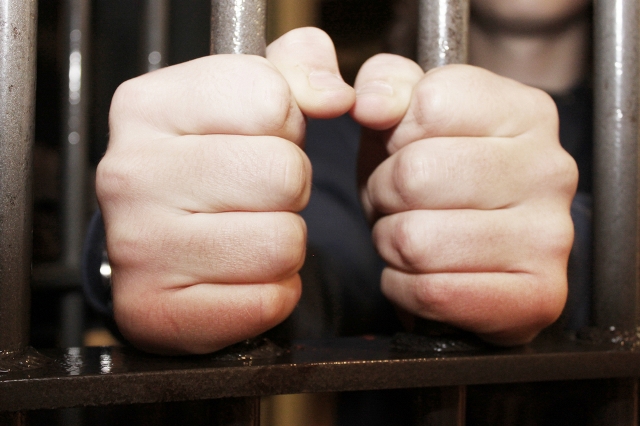ABA and CMS Event Focuses on ABA Civil Immigration Detention Standards and Need to Reform U.S. Immigration Detention Policies | Human Rights First
11-15-2012
By Eleanor Acer
Refugee Protection Program
The American Bar Association’s (ABA) new Civil Immigration Detention Standards were the topic of discussion at an event held yesterday in New York City. The
event – entitled “a Dialogue on ABA Civil Immigration Detention Standards: Promoting Fair Treatment and Access to Justice” – was sponsored by the
American Bar Association and the
Center for Migration Studies. Speakers at the event included Donald Kerwin, the Executive Director of the Center for Migration Studies; Dora Schriro, Commissioner, New York City Department of Correction and ABA President-Elect James R. Silkenat.
(courtesy Will Coley).
At its annual meeting in August, the American Bar Association
adopted civil immigration detention standards. The standards are meant to provide the U.S. Department of Homeland Security (DHS) with a guide for developing civil detention standards and transforming the immigration detention system to a system that befits its civil detention authority. As the ABA standards note, “Despite DHS’s civil legal authority, the management of the U.S. immigration detention system is based on a criminal detention model.”
As several of the speakers detailed, the overwhelming majority of immigration detainees are held in jails and jail-like facilities where they wear prison uniforms, have limited outdoor access, and visit with family through plexiglass barriers. The system relies on excess capacity in criminal correctional facilities and utilizes facilities designed for detention in the criminal justice system. Ironically, as documented in Human Rights First’s 2011 report,
Jails and Jumpsuits: Transforming the U.S. Immigration Detention System—A Two-Year Review, many criminal correctional facilities actually offer less restrictive conditions than those typically found in immigration detention facilities, and corrections experts have confirmed that a normalized environment helps to ensure the safety and security of any detention facility.
The ABA Standards stress that “[a]ccess to legal services is critical to a fair and efficient immigration removal and detention system.” The standards explain, in their guiding principles, that:
Residents should not be held in jails or jail-like settings. DHS/ICE [Immigration and Customs Enforcement] should normalize living conditions in all detention facilities to the greatest extent possible. Civil detention facilities might be closely analogized to “secure” nursing homes, residential treatment facilities, domestic violence shelters, or in-patient psychiatric treatment facilities. Such facilities should have ample common space, freedom to move within the facility, extended access to indoor and outdoor recreation, and abundant opportunities to relate to other residents and to persons outside the facility.
Among the key components outlined in the ABA civil detention standards:
- Facilities should be located near adequate non-profit, pro bono, or low cost legal services;
- The physical plant of facilities should allow for privacy, freedom of movement and access to outdoor recreation;
- Residents should be allowed to wear their own clothing and should not be subjected to clothing restrictions apart from those deemed strictly necessary for security;
- There should be substantial outdoor space for recreation, and residents should have free access to outdoor recreation throughout the day; and
- Facilities should permit contact visitation; non-contact visits may be required only following an individualized determination that an in-person visit would pose a danger.
The ABA’s expert advisory task force which provided guidance in the developments of the ABA civil detention standards included Michele Deitch, a leading expert on prison oversight and detention standards; Jim Ziglar, former Commissioner of the Immigration and Naturalization Service and Human Rights First board member; and Dr. Schriro, one of the speakers at yesterday’s event.
Over the last few years, international human rights authorities have repeatedly confirmed that the use of immigration detention facilities that are penal in nature is inconsistent with U.S. human rights commitments:
- In reports specifically focused on the United States, the Inter-American Commission on Human Rights and the former U.N. Special Rapporteur on the Human Rights of Migrants both expressed concern about the punitive and prison-like conditions used by the U.S. government in its immigration detention system, with the latter noting that “freedom of movement is restricted and detainees wear prison uniforms and are kept in a punitive setting.”
- The U.N. Refugee Agency (UNHCR), in its 2012 Guidelines on Detention, stressed that the “use of prison, jails, and facilities designed or operated as prison or jails, should be avoided,” and that “[c]riminal standards (such as wearing prisoner uniforms or shackling) are not appropriate.”
- The current U.N. Special Rapporteur on the Human Rights of Migrants, in his 2012 report on immigration detention, confirmed that immigration detainees “should not be subject to prison-like conditions and environments, such as prison uniforms, highly restricted movement, lack of outdoor recreation and lack of contact visitation” and that states should “allow[] administrative detainees to wear their own clothing.”
In 2009, DHS Secretary Janet Napolitano and ICE Director John Morton committed to transform the U.S. immigration detention system away from its longtime reliance on jails and jail-like facilities, to facilities with conditions more appropriate for civil immigration law detainees. Yet, three years later the vast majority of immigration detainees are still held in jails and jail-like facilities. As the
New York Times noted in a December 2011
editorial: “Immigration and Customs Enforcement has begun to develop some less-restrictive facilities, those will house fewer than 15 percent of detainees. The rest will remain in a world of prison uniforms and barbed wire. New standards to guide officials in making reforms have not yet been developed.”
Speakers and attendees at the ABA-CMS event discussed ways in which the Obama administration, as it embarks on a second term and moves forward to address immigration reform, would have the opportunity to renew its commitment to transform the immigration detention system away from its reliance on jails and jail-like facilities. Several speakers stressed the importance of utilizing cost-effective alternatives to detention in place of detention that is unnecessary, and Dr. Schriro noted that other detention systems do not interpret a government’s appropriation of funding for a particular number of detention beds to mandate the detention of that number of individuals. She also stressed that civil immigration detention “isn’t like, and shouldn’t be like criminal incarceration.” In addition to stressing the importance of legal representation in immigration matters, ABA President-elect Silkenat affirmed the ABA’s commitment to see the ABA Civil Detention standards adopted by ICE and to play a leading role in advancing detention reform over the next few years.
Tags:
immigration detention,
Refugee Protection Program

















